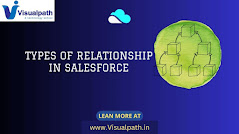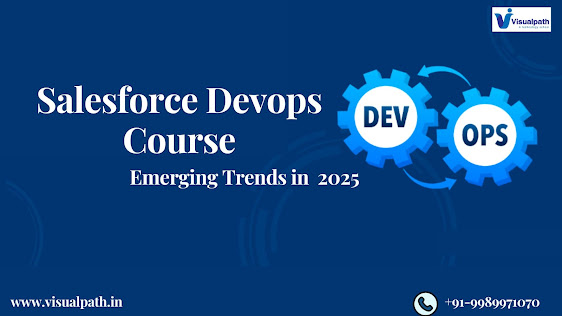Salesforce DevOps? Types of Relationship Fields in Salesforce
Introduction:
In the ever-evolving landscape of software development, the
integration of Salesforce DevOps practices has become essential for
streamlining processes, enhancing collaboration, and accelerating the delivery
of high-quality products. Salesforce, a leading customer relationship
management platform, is no exception to this trend. Central to this approach
are various relationship fields that play a crucial role in managing data
relationships within Salesforce. Let's explore these relationship fields and
their significance in Salesforce DevOps.
- Salesforce Online Training
Understanding Relationship Fields:
Relationship fields in Salesforce establish connections
between different objects or records within the platform. They enable
developers to represent complex data relationships and facilitate efficient
data management.
Lookup Relationships:
Ø Lookup relationships allow linking
two objects together in a parent-child relationship. In this type of
relationship, one object serves as the parent, and another as the child.
Ø The child record contains a lookup
field that references the parent record. Lookup relationships are commonly used
when there's a one-to-many association between records. - Salesforce DevOps Online Training
Institute
Master-Detail Relationships:
Ø Master-detail relationships are
similar to lookup relationships but with stricter enforcement of data integrity
and behavior. In a master-detail relationship, the detail record is tightly
bound to its master record.
Ø Deleting the master record
automatically deletes associated detail records. Master-detail relationships
are ideal for representing one-to-many relationships with a clear ownership
structure.
External Lookup Relationships:
External lookup relationships extend the capabilities of
standard lookup relationships by enabling connections to records outside the
Salesforce platform. This type of relationship is valuable when integrating
Salesforce with external systems or when referencing data stored in other
databases.
Hierarchical Relationships:
Ø Hierarchical relationships define a
parent-child relationship within a single object. This type of relationship is
commonly used to represent organizational hierarchies or reporting structures
within Salesforce. - Salesforce DevOps Training in
Hyderabad
Conclusion:
Salesforce DevOps relies heavily on effective data management
and collaboration, making an understanding of relationship fields crucial for
developers and administrators. By leveraging different types of relationship
fields, organizations can design robust data models that accurately represent
their business processes and enhance their Salesforce development practices.
Visualpath is one of
the best Salesforce Online Training institutes in Hyderabad. We are providing
Live Instructor-Led Online Classes delivered by experts from Our Industry. We
will provide live project training after course completion. Enroll Now!!
Contact
us +91-9989971070.
WhatsApps: https://www.whatsapp.com/catalog/919989971070
Visit : https://visualpath.in/salesforce-devops-online-training.html




Comments
Post a Comment